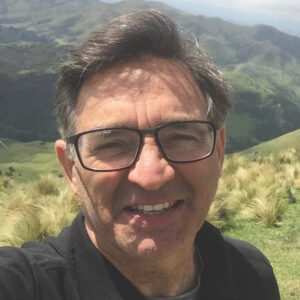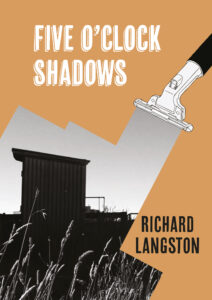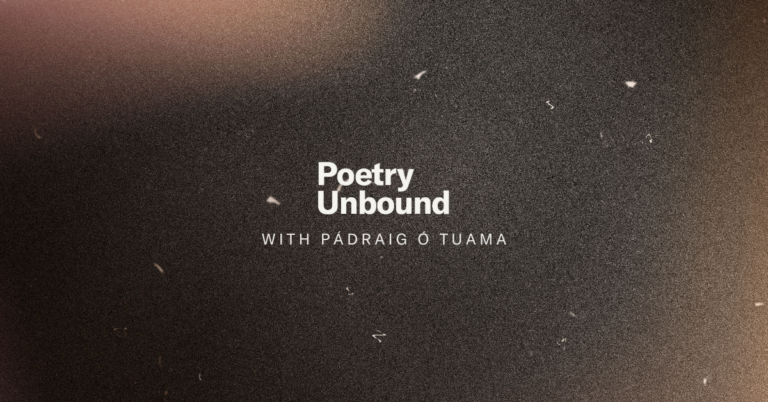Richard Langston
Hill walk
In Richard Langston’s poem “Hill walk,” he proffers a handful of things that move us over the course of a day — words said or read, notes played, the sight of halting steps taken by a sibling. We marvel at the sound of an unfamiliar bird call, but there’s a startling mystery to the human heart and what it responds to (or doesn’t) and one that we don’t always mark.
We’re pleased to offer Richard Langston’s poem and invite you to subscribe to Pádraig’s weekly Poetry Unbound Substack newsletter, read the Poetry Unbound book, or listen to past episodes of the podcast. We also have two books coming out in early 2025 — Kitchen Hymns (new poems from Pádraig) and 44 Poems on Being with Each Other (new essays by Pádraig). You can pre-order them wherever you buy books.
Guest

Richard Langston is a veteran broadcast journalist and director. He comes from Dunedin, New Zealand, and was a driving force in the city’s music scene in the 1980s. He now lives in Wellington and is a proud member of the three-person South Wellington Poetry Society. His poetry collection, Five O’Clock Shadows, was published in 2020 by The Cuba Press.
Transcript
Transcription by Alletta Cooper
Pádraig Ó Tuama: My name is Pádraig Ó Tuama, and those lists that you see on social media or in newspapers or online articles that say “how to in five steps” draw me in as much as anybody else is drawn in. How to be fitter, how to be healthier, how to be more productive, how to be this, how to be that. And some of them have got really good ideas, but one of the things that they’re doing is they’re promising a way within which change can happen. But sometimes — often — change happens in surprising ways, in a way that you’re not prepared for at all, sometimes beautifully, sometimes brutally. Change just comes and we’re there to look at it, to respond and to try to figure out what to do in the aftermath, and also try to figure out how did that happen and where did it come from.
[music: “Praise the Rain” by Gautam Srikishan]
“Hill walk” by Richard Langston
“We often wonder
what moves us in a day –
was it words in a sequence
that surprised us
“or notes played by someone
who kept their mouth closed
& let the sound leave
their broken body
“or maybe after years
it was the sight of your brother
nursing his leg down the hill
catching up with you
“so you could walk
on together to discuss
what bird that was in
the bush making the sound
“neither of you were certain of.”
[music: “Daybreak” by Gautam Srikishan]
I love the modesty of the beginning of this poem by Richard Langston. “We often wonder / what moves us in a day.” And then the way that he goes through. Was it words or notes or a sound or a sight? He’s going through the senses perhaps, or some of them anyway, wondering what is it that sticks with you during the day. What is it that is important? The word “move” is such an interesting word. We use it all the time. I do, anyway. You can say, “Check out your move” to someone showing off their dance moves to you. Or “Move on” an old boss used to say when we were finishing up a meeting. Another friend says, “Move on” when she’s about to lose her temper — move on, move on topic, move on conversation, move on physically. You can talk about moving through the body. You can also be used in the court, to move the court. And then of course, also you can talk about it on a formal level with organizations that an organization moves their position or they move some idea or they move emotion. And so looking at this question, “We often wonder what / moves us in a day.” There are layers upon layers present to us in the simplicity of that word. “What moves us.” I like to think about what the emotion of a word is. And obviously, it depends as to the context in which you’re using it, but when you’re thinking about what moves you in a day — maybe especially if there’s something that’s being repaired between people — the word move is a gentle one. Starting off with that soft M and then into the elongated “ooo” of move.
[music: “Memoriam” by Gautam Srikishan]
It’s such a gentle poem, this one. But in each of the examples that Richard Langston gives, there is something that has an edge of pain to it or an edge of surprise or an edge, perhaps, of at least being unexpected. “Words in a sequence / that surprised us.” “Notes played by someone / who kept their mouth closed / & let the sound leave / their broken body.” Maybe the music isn’t particularly from a whistle or a wind instrument. Maybe it’s somebody who’s been injured, who’s dying, the ways within which noise comes from us and a certain kind of humming, a certain kind of communication of proximity, an indication of being alive, an indication of being in pain or beyond words.
And then “after years,” there’s this “brother / nursing his leg down the hill.” And they don’t say what the problem is — if there has been a problem — instead, they look at the bush and wonder what bird it is. And so each of these suggestions about the kind of thing that might move you are things that are slightly to the left of center, slightly off-kilter. Enough to catch your attention, but also enough to remind you you don’t have complete control. And that I think is one of the interesting things throughout this whole poem. It’s a poem where he’s holding human encounter very lightly.
[music: “Creatures of Myth” by Gautam Srikishan]
I’ve always wondered, what is the specificity of this brother? “It was the sight of your brother / nursing his leg down the hill / catching up with you // so you could walk / on together.” And they were on the hill together, so clearly, it’s not like they haven’t seen each other, but something seems to have occurred. Why that “after years?” Is it the injury or the malady of the leg that is the thing that’s lasted for years? Or has there been some lack of language or some lack of communication over years? I don’t know, but I feel the weight of it. I wonder if they’ve kept some kind of distance or not engaged with each other much despite some kind of proximity.
The limping brother reference absolutely brings the story to mind from the Hebrew Bible of these twins, Jacob and Esau. When they were younger, one’s smooth and suave and the other’s hairy and brawny, and they’re pitted against each other. And after years and years, and I think after the death of their parents, they reconcile and each at this stage is some kind of patriarch. And just before one of them meets the other, he wrestles with an angel and the angel touches his hip and he has to limp with a sore leg on his way to meet his brother. People have tried to interpret that for years as a reminder of if you wrestle with God, you’ll never win. Or that we need some reminder of our limitation and that the need to eventually reconcile, perhaps, or the desire to eventually reconcile might remind us of frailty and to remind us of necessity.
What’s interesting in the biblical story is that these two brothers don’t discuss too much about the source of their original estrangement and neither do the brothers in Richard Langston’s poem. They talk about the bird. “What bird that was in / the bush making the sound // neither of you were certain of.” I love this, like a secular rendition of an old biblical story. Instead of God wrestling with one brother, giving him a limp, it’s a bird that they can’t classify. Some piece of mystery, but also some piece of music.
[music: “The House You Wake In” by Gautam Srikishan]
If Richard Langston had written this poem in the first person —“I often wonder what moves me in a day” — we would be really particularly focused in on the specifics of this, perhaps, in the life of a poet or at least the life of a speaker of a poem. And I know nothing about him apart from a couple of broad biographical details. He’s from a Lebanese family living in New Zealand. They’d migrated there. I don’t know if he’s speaking about something in his own circumstances. But what interests me is the kindness, really, in the way that he puts forward the “we”. “We often wonder what moves us in a day–” He’s asking a general question, and he is posing some particular ways in which some catching up happens between people who, for years, there seems to have been some kind of distance between. The “we” maybe allows us to ponder the kind of ways people need to come together, but also to avert the gaze from something that might be quite private. We witness these brothers walking alongside each other, not discussing the years of their distance, but instead wondering about the bird that they can’t quite classify.
I like the way within which a poem that is, perhaps, referring to something that did occur or might be happening every single day. The broad “we” of it allows us all to think these things happen, but while these brothers don’t know what bird it was that was making that song, we, the readers, don’t need to know what it was that happened between these brothers that we can think, well, that brother is me, that brother is you. These siblings are all of us in the distances we maintain with each other, and in the proximities we might find through some mysterious way that land brings us back together.
[music: “Family Tree” by Gautam Srikishan]
“Hill walk” by Richard Langston
“We often wonder
what moves us in a day –
was it words in a sequence
that surprised us
“or notes played by someone
who kept their mouth closed
& let the sound leave
their broken body
“or maybe after years
it was the sight of your brother
nursing his leg down the hill
catching up with you
“so you could walk
on together to discuss
what bird that was in
the bush making the sound
“neither of you were certain of.”
[music: “Praise the Rain” by Gautam Srikishan]
Chris Heagle: “Hill walk” comes from Richard Langston’s book Five O’clock Shadows. Thank you to the Cube Press who gave us permission to use Richard’s poem. Read it on our website at onbeing.org.
[music: “Praise the Rain” by Gautam Srikishan]
Poetry Unbound is: Gautam Srikishan, Eddie Gonzalez, Lucas Johnson, Kayla Edwards, Tiffany Champion, Cameron Musar, and me, Chris Heagle.
Our music is composed and provided by Gautam Srikishan and Blue Dot Sessions.
This podcast is produced by On Being Studios, which is located on Dakota land. Open your world to poetry with us by subscribing to our Substack newsletter. For links and to find out more visit poetryunbound.org.
Books & Music
Recommended Reading
The On Being Project is an affiliate partner of Bookshop.org and Amazon.com. Any earnings we receive through these affiliate partnerships go into directly supporting The On Being Project.







